
Guest Author
Welcome to the dynamic world of social media for doctors – a vital frontier for modern health professionals.
In today’s digital age, doctors must establish a presence on social media platforms. This approach isn’t just about self-promotion; it’s about connecting with patients, building a personal brand, and fostering valuable networks within the medical community.
However, the role of doctors on social media extends beyond these personal benefits. With an audience eagerly seeking trustworthy health information, doctors have a golden opportunity. By mastering social media management, they can transform into influential figures in their specialties.
This post will guide you through the top social media platforms for doctors, content ideas to include in your social media strategy, and some of the challenges to consider before posting online.
Streamline your marketing with an efficient social media strategy template.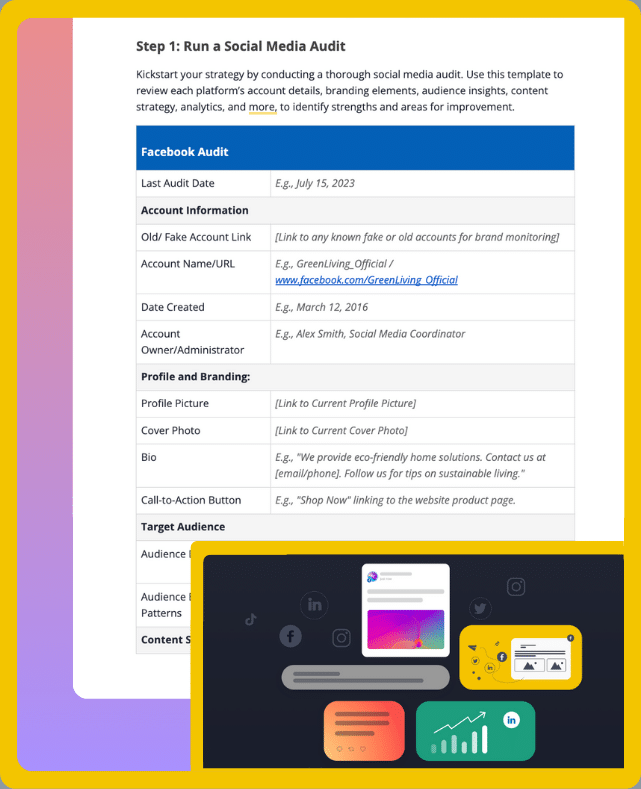
Short Summary
- Social media is essential for doctors as it allows them to build their personal brand, share educational resources, and engage with the medical community.
- Many doctors are active on traditional social media channels, like YouTube and TikTok. Others choose to post on networks specialized for healthcare providers, such as Daily Rounds or Student Doctor Forum. The best social media platforms for you depend on your goals and the audience you’re trying to reach.
- Doctors can create educational and engaging social media content – from reacting to viral trends and debunking myths to hosting Q&As and quizzes.
- The same ethical principles that you follow offline also apply online. Before starting on social media, consider your institution’s social media policy and local legal regulations.
Why Should Doctors Focus on Their Social Media Strategy?
When everyone and everything is happening on social media sites, having an active social media presence can be a deal-breaker for healthcare professionals.
Here are a few reasons doctors should be active on social media sites:
- Reach patients
- Educate your audience
- Improve customer service
- Network with online personalities
- Build your brand
1. Reach Patients
A robust social media presence aids in building trust and brand awareness. Using social media as a doctor can help you build loyalty with current patients and attract new ones.
Posting actively on every social media network also keeps you on top of patients’ minds. Whenever they need to treat a relevant health issue, they’ll think of you and trust your expertise.
2. Educate Your Audience
The popularity of social media makes it an excellent platform for reaching and educating a broad audience.
You can inform patients about required checkups, common misconceptions, and best practices. Share recent research data and commentary to make it accessible to the general public.
This approach can encourage them to make healthy and informed lifestyle choices.
3. Improve Customer Service
You can use social media to provide convenient customer service and establish a strong connection with your patients outside your doctor’s office.
For example, you can allow patients to request appointments through Facebook or Instagram. Or, you can publicly address frequently asked questions and answer patients in direct messages.
4. Network with Online Personalities
Social media presents an unmatched opportunity for networking with other medical professionals and influencers promoting healthy lifestyles. Thus, it opens the doors to diverse collaboration opportunities.
Let’s say you’re a medical oncologist who wants to build awareness around breast cancer. You can partner with colleagues from the same or related fields to discuss the latest research around breast cancer prevention. Another option is to co-create content with an influencer that has a predominantly female audience.
5. Build Your Brand
Branding is the process of establishing a unique identity that separates you from others in your niche. Social channels provide a platform where you can share your experience, skills, and values, helping you build a strong brand that sets you apart.
To start with branding, decide what you stand for and what you want to represent as an individual.
Next, define your desired audience, how you want to make them feel, and what impact you want to have through your content. Browse examples of successful personal brands to gather ideas and inspiration.
Top Social Networks for Healthcare Professionals
When deciding what social media to use as a doctor, you can opt for platforms specifically designed for physicians or traditional social channels.
Let’s take a look at both options:
- Social media platforms designed for the healthcare industry
- Traditional social media platforms for doctors
1. Social Media Platforms Designed for the Healthcare Industry
As a doctor, choosing the right social media platform can significantly impact your professional networking and patient outreach. Specialized social media platforms designed specifically for the healthcare industry offer unique opportunities for collaboration, learning, and professional growth.
Here are some notable platforms designed for healthcare professionals:
- DailyRounds: A network that offers case studies and discussions, making it ideal for doctors who want to share and learn from real-world medical cases.
- Virtual Doctors Lounge: The Virtual Doctors Lounge platform serves as a virtual meeting space for physicians to discuss medical cases, share insights, and seek advice from peers.
- Among Doctors: A community where healthcare professionals can network, collaborate, and share their expertise.
- Student Doctor Network Forum: An invaluable resource for students and practicing doctors alike, this forum provides a space for educational discussions and career advice.
- Sermo: Known for its large network of verified physicians, Sermo offers a platform for medical surveys, discussions, and collaboration on patient care.
- Doximity: Often dubbed as ‘LinkedIn for doctors,’ Doximity provides a professional network for clinicians to connect and collaborate.
These platforms provide a specialized environment where healthcare professionals can engage in detailed medical discussions, share case studies, and network with peers.
They are particularly valuable for those seeking a community of professionals with shared interests and challenges in the medical field.
2. Traditional Social Media Platforms for Doctors
Choosing the right social media platform as a doctor depends on your audience and goals:
- YouTube: Ideal for long-form, educational content. Create detailed videos about specific conditions and treatments for a broad audience.
- TikTok: Best for very short, engaging videos. Share quick tips and fun facts about your medical profession to reach a younger demographic with fast-paced content.
- Instagram: Use for slightly longer clips and photo-based content. Share before-and-after images, infographics, and short videos for a more personal connection.
- X (formerly Twitter): Ideal for real-time updates, brief insights, and professional discussions. Share news and link to longer content.
- Facebook: Great for building a community and engaging with a diverse age range. Share practice updates, patient stories, and informative posts.
- LinkedIn: Tailored for professional networking and in-depth, industry-focused content. Post medical news, research updates, and network with healthcare professionals.
Each social network serves a unique purpose, catering to different aspects of your professional and public outreach as a medical professional.
SocialBee allows you to customize and schedule your posts for each social media channel. This not only saves time but also ensures that your content is optimized for each platform’s audience and style.
To manage your presence across these diverse platforms efficiently, an AI-powered social media management tool like SocialBee can be invaluable. SocialBee allows you to post content on all important social networking sites from a single dashboard.
You can also use SocialBee’s content categories to organize your social media posts efficiently, ensuring a balanced mix of educational, personal branding, and interactive content for effective audience engagement.
Plan and schedule your social media content with ease.
Start your 14-day free trial at SocialBee today!
This not only saves time but also helps in maintaining a consistent online presence. You can schedule posts, track performance, and even curate content relevant to your field.
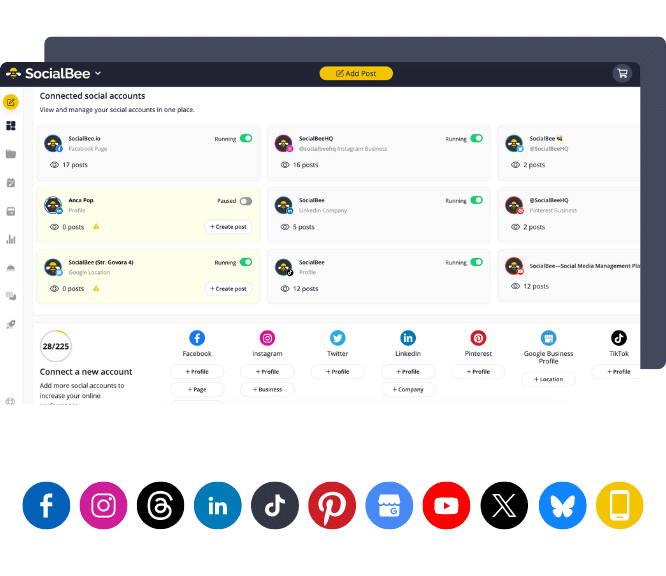
SocialBee: The Best Time-Saving Social Media Solution for Doctors!
Social Media Content Ideas for Doctors
Now that you know all the benefits of social media for doctors, let’s look at some content ideas and examples from physicians who’ve already amassed a large follower base.
Here are some examples of content doctors can share on their social media accounts:
- Show behind-the-scenes content
- Debunk myths
- React to popular videos
- Create helpful content
- Share patients’ success stories
- Host Q&As
- Test health knowledge with quizzes
1. Show Behind-the-Scenes Content
Uncover what happens behind the scenes – what doctors see but patients don’t.
People are always curious about the things they don’t have access to. That’s why bloopers or behind-the-scenes social media videos are so interesting.
Sharing a new perspective also allows people to understand and appreciate a physician’s job better.
Take a look at this TikTok video from a pathologist who explains their role in executing lab tests – something the general public can’t see.
The content should be informative yet accessible to a lay audience, helping to better understand the medical profession and highlighting the extensive work that goes into patient care behind the scenes.
2. Debunk Myths
Debunking myths is an excellent topic for content because it challenges popular misconceptions from the perspective of a trained professional. For audiences, it’s not only fascinating but also practical.
Health myths usually stem from traditional beliefs and have no scientific proof. While many are harmless or not effective, others might pose risks.
The rise of social media and self-proclaimed experts has led to a rapid spread of misinformation in all fields, including healthcare. As a professional, you are in a position to address inaccuracies, provide data-backed information, and educate.
Take inspiration from dermatologist Dr. Sam Ellis, who debunks some of the most popular hair care myths.
3. React to Popular Videos
Creating content around topics that are already popular or trending is a great way to reach new audiences. While you can follow the trends, many doctors decide to react to them.
For instance, TikTok’s platform is built to promote trends – trending audios, dances, video formats, products, etc. As a result, many health and beauty trends start on this social channel.
In this video, dermatologist Dr. Shereene Idriss reacts to skincare trends from TikTok. The products and techniques she reviews are somewhat beneficial, but she also reveals they do not work as promoted.
Another video idea comes from Doctor Mike, who reacts to a popular episode from Grey’s Anatomy and gives medical commentary.
As you can see, a certified physician can add much value by sharing informed opinions on popular social media or TV series videos.
4. Create Helpful Content
Physicians have a lot of useful information to share, and depending on their specialty, they can cover diverse topics.
You can get ideas for helpful content by noting questions or cases you often get in your practice. Is there something many patients seem to miss or something you get asked about daily?
Let’s look at an example of video marketing for dentists from Dr. John Yoo, who shares his oral care routine.
Covering such topics can educate your audience. Also, as your time during a patient’s visit is limited, you can point them to your resources for additional reliable information.
5. Share Patients’ Success Stories
Sharing success stories from your patients can be informative and inspirational, but it can also be promotional.
Some doctors can create before-and-after collages of their patients. It is a popular approach when you want to demonstrate changes—maybe your patient has lost weight, improved their posture, or had a cosmetic procedure. Here’s an example from a dermatologist showing the results of a patient who received treatments for uneven skin tone.
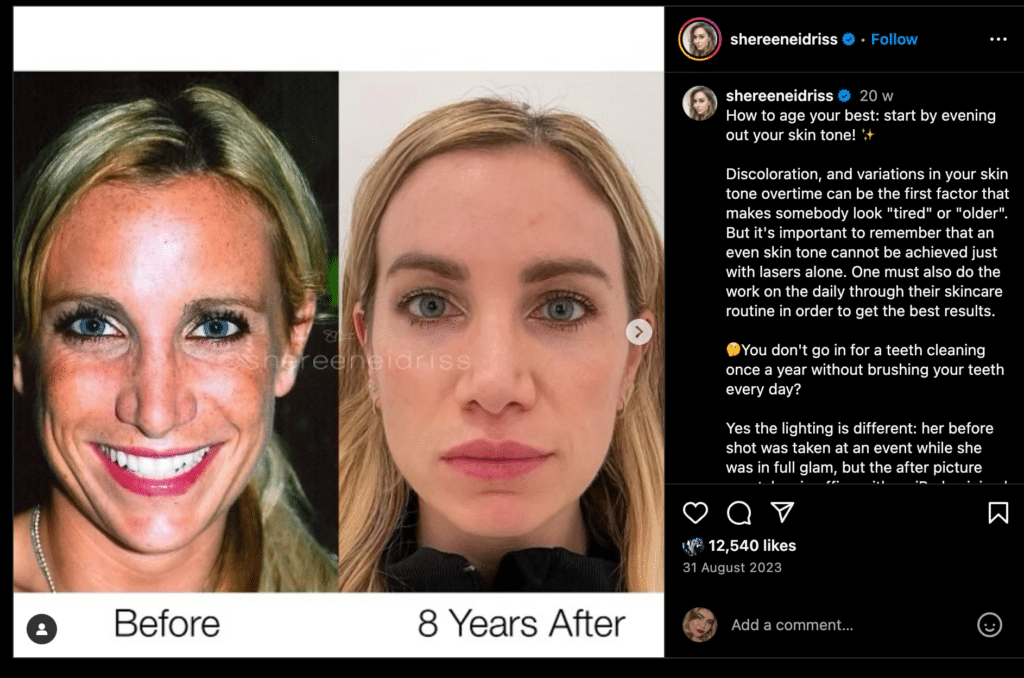
However, remember that you can be held liable for revealing information that may expose a patient’s identity. In this article’s “Protecting patient privacy” section, you’ll find more tips on safely sharing patients’ success stories.
6. Host Q&As
Q&A content allows you to answer common questions and build a connection with your audience. For Q&As, creators usually ask their followers to send them questions. As a result, active members of your audience feel seen and valued.
Here are some ideas for hosting Q&A sessions on social media:
- Use Instagram’s question sticker to collect questions and answer them in stories.
- Gather questions through Instagram/TikTok comments and create a short video for every answer.
- Ask your subscribers to submit questions as comments on YouTube and respond in your next video.
- Hold live Q&A sessions – live streaming is one of the top 2024 video trends, and it’s unique because it prioritizes real-time interactions and feedback.
Here’s a Q&A example from Violin MD, who shares her experience of becoming a doctor with medical students.
You can also ask users to submit questions on one social channel and reply on another. This way, you encourage people to follow and consume your content on different platforms.
7. Test Health Knowledge with Quizzes
Quizzes are engaging and educational, and you can also use them to collect followers’ emails for campaigns outside of social media.
You can create native quizzes on Instagram, but they have limited data collection and analysis capabilities. With an online quiz maker, you can create interactive trivia quizzes and test your followers’ knowledge on health topics.
Source: Opinion Stage
Users can also see clarifications about the correct answers, which provides additional context and helps educate them on the topic.
Challenges of Social Media for Doctors
While social media for doctors has many benefits, you also have to be cautious when building your online presence to avoid any ethical or legal conflicts.
Here are some of the challenges for doctors and other healthcare professionals when it comes to social media:
- Giving medical advice online
- Facing ethical issues
- Limiting the spread of misinformation
- Following employer policies
- Protecting patient privacy
1. Giving Medical Advice Online
For medical professionals, it is best to avoid giving medical advice to their followers because, when you do, you become liable for the results they get.
In an online setting, you don’t have a way to examine a patient or gather details without exposing them to privacy threats. Also, you can’t verify that the information they’re providing is accurate.
Stick to sharing best practices and general tips, but refrain from establishing a doctor-patient relationship.
2. Facing Ethical Issues
Sponsored content, i.e., promotional content paid for by a brand, can lead to ethical conflicts of interest for doctors on social media.
Before deciding to endorse a product, ensure that you’ve researched it in detail and are informed about local legislation surrounding advertising.
Partnering with brands is a typical revenue stream for influencers. Their main legal requirements are to have personal experience with the products they’re recommending and to clearly and visibly disclose advertisements.
However, if you are a physician endorsing a product, your audience can expect it to be clinically tested, proven to be effective, and in line with modern health standards. Medical ethics also require you to share information about adverse effects.
3. Limiting the Spread of Misinformation
Misinformation is a serious concern about all online content. Due to their profession, doctors on social media are responsible for the accuracy of the health information they share. So, take extra care before citing studies and statistics or making bold statements.
When referencing studies, ensure they are reliable, preferably from reputable medical journals. Online creators often share information they’ve heard from other creators without researching the original sources.
That’s how misleading information such as “we use only 10% of our brains” gets diffused and widely believed to be true.
Another pitfall is overpromising. If you make a bold claim and your advice doesn’t deliver, you lose the trust of your audience. It can be especially problematic when patients follow your online advice.
4. Following Employer Policies
Before starting with social media marketing, you must read your institution’s social media policy.
Most social media policy clauses are common sense – do not post anything that violates the law, looks unprofessional, compromises your employer’s reputation, or discloses confidential information.
However, some institutions are more strict, and they consider improper use of social media for doctors the following:
- Sharing patient pictures even with informed consent
- Posting personal videos filmed on the hospital’s facilities
- Using hospital devices to access social media during work hours.
If you are not sure, it’s better to check in advance to make sure your social media activities are permissible. Address any doubts to your superior or the HR team.
5. Protecting Patient Privacy
As a doctor, you have access to a lot of patient information, and it’s essential to manage it properly.
Start by reviewing the Health Insurance Portability and Accountability Act (HIPAA) – a federal law outlining best practices for protecting patients’ health data.
When giving examples, it’s best to speak in generalities or to make fictional cases. In this way, you ensure that third parties cannot infer the identity of your patients.
If you want to post about a real case, especially when sharing photos, videos, interviews, etc., you must receive written consent from the patient or their guardian. They must understand the potential risks of sharing their story online.
Frequently Asked Questions
YouTube, TikTok, and Instagram are the most popular social networking sites for doctors. You will also find certified physicians on Facebook, Twitter, LinkedIn, and even Reddit. Some doctors use specialized networks such as DailyRounds, Among Doctors, Sermo, Student Doctor Network, and Doximity.
As of January 2024, the most popular doctor on social media is Dr. Sandra Lee, who has a strong social media presence and over 33 million followers across all mainstream social networks. Most of her followers come from TikTok (16.7M) and YouTube (8.2M).
Some of the most followed influencers in the medical community on TikTok as of 2024 are:
- Dermatologist @dermdoctor – 18.2M followers
- Dermatologist @drpimplepopper – 16.7M followers
- Plastic Surgeon @doctoryoun – 8.3M followers
- Emergency Physician @lifeofadoctor – 3.9M followers
- Foot surgeon @footdocdana – 2.3M followers
Promote Your Medical Practice on Social Media
Social media is an excellent channel for doctors to market their practice and connect with patients online. But with privacy regulations and the specifics of every platform, it can seem daunting to get started.
SocialBee makes managing multiple social profiles a breeze. It offers an AI assistant to help you build your social media strategy, content creation and scheduling tools, and an interface to manage all your comments and DMs in one place.
Start your free 14-day trial to test all that SocialBee has to offer!

Post Your Medical Content on Social Media with SocialBee!
About the author: Evelina Milenova is the Outreach Manager at Opinion Stage. Evelina’s expertise lies in SEO and content marketing – two topics she often writes about on her LinkedIn page.
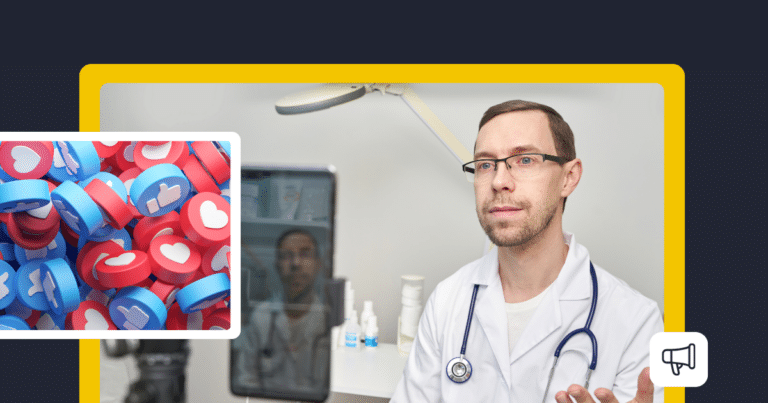
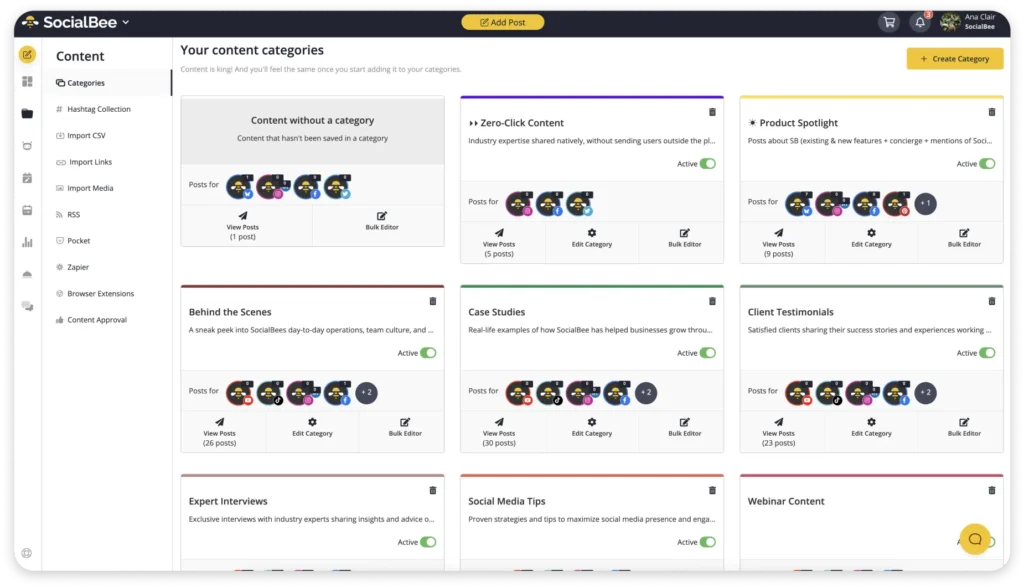
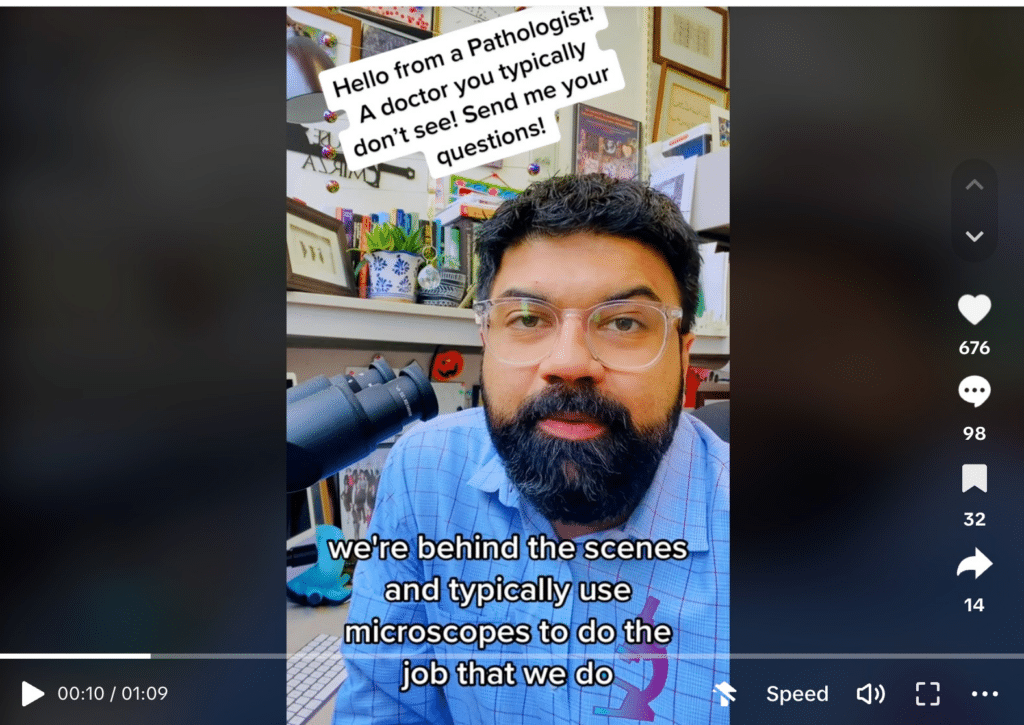
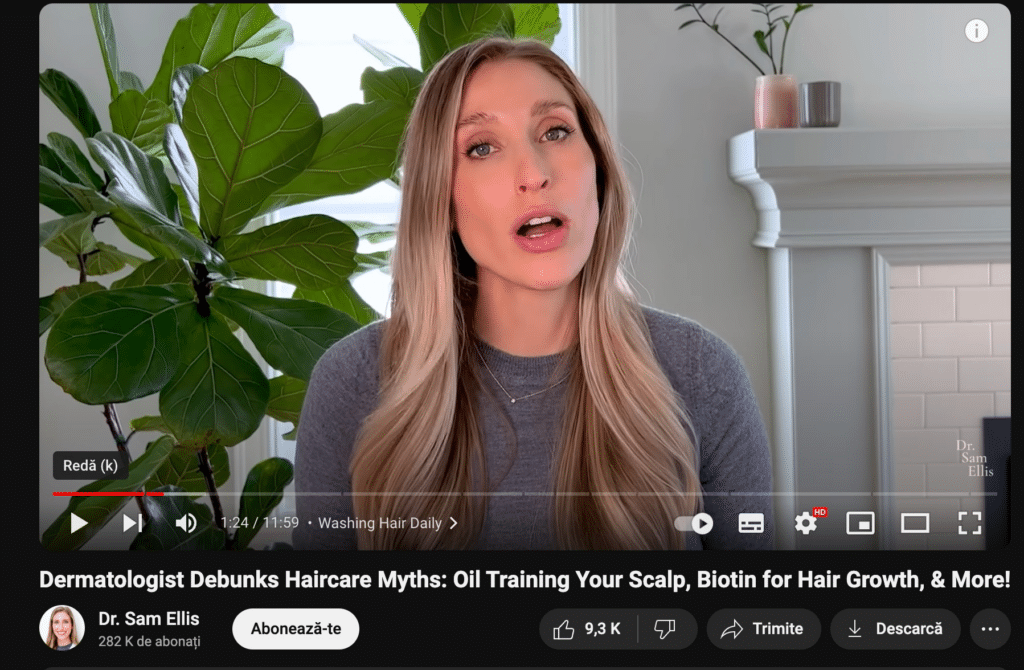
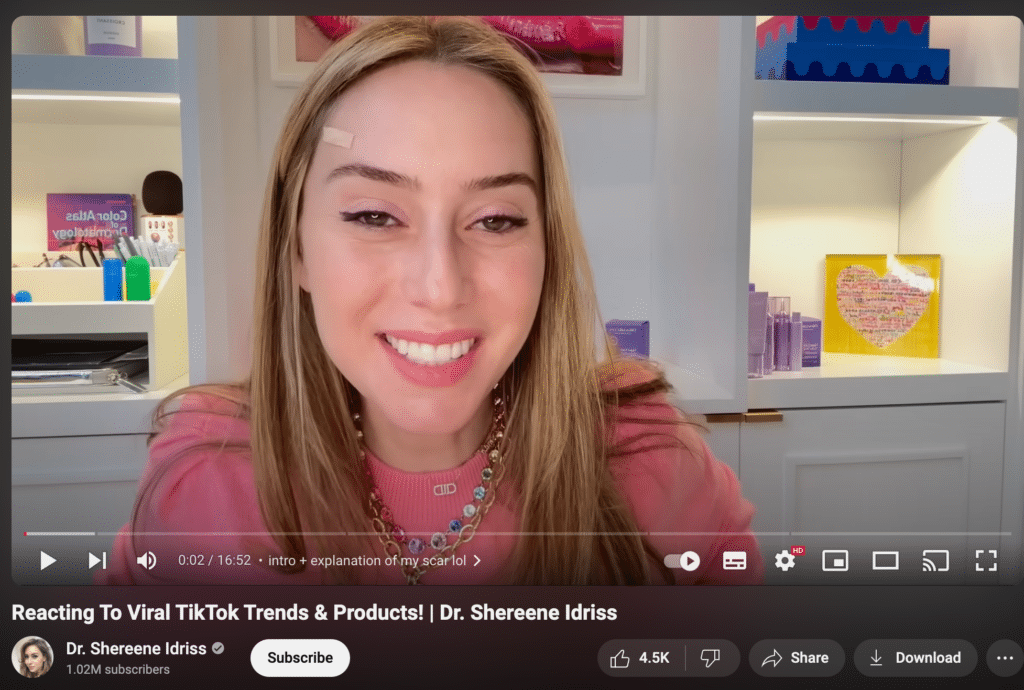
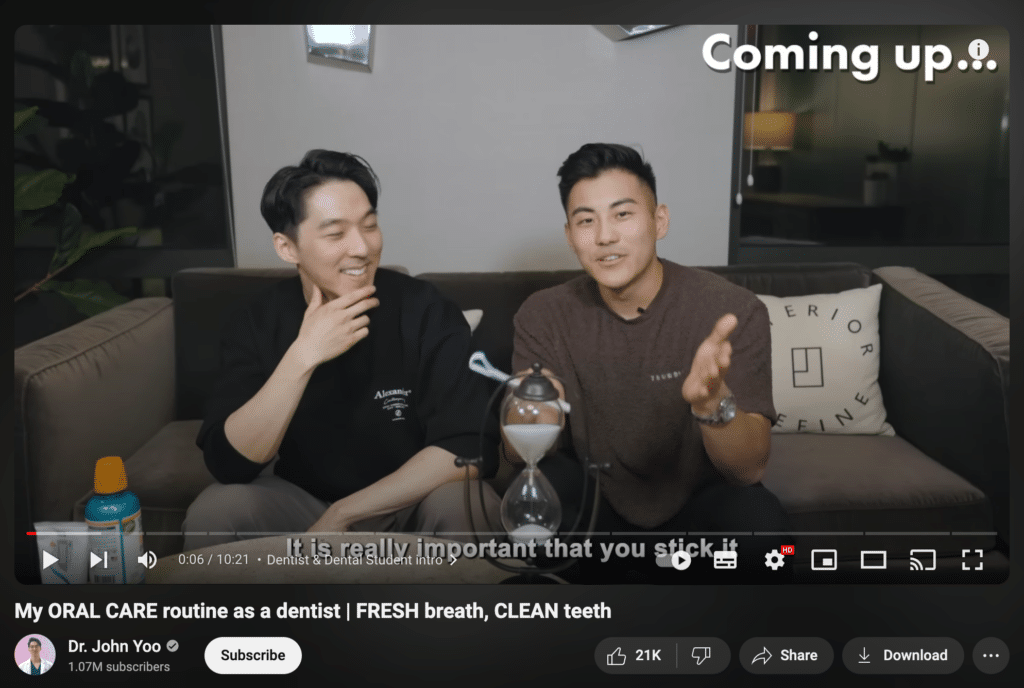
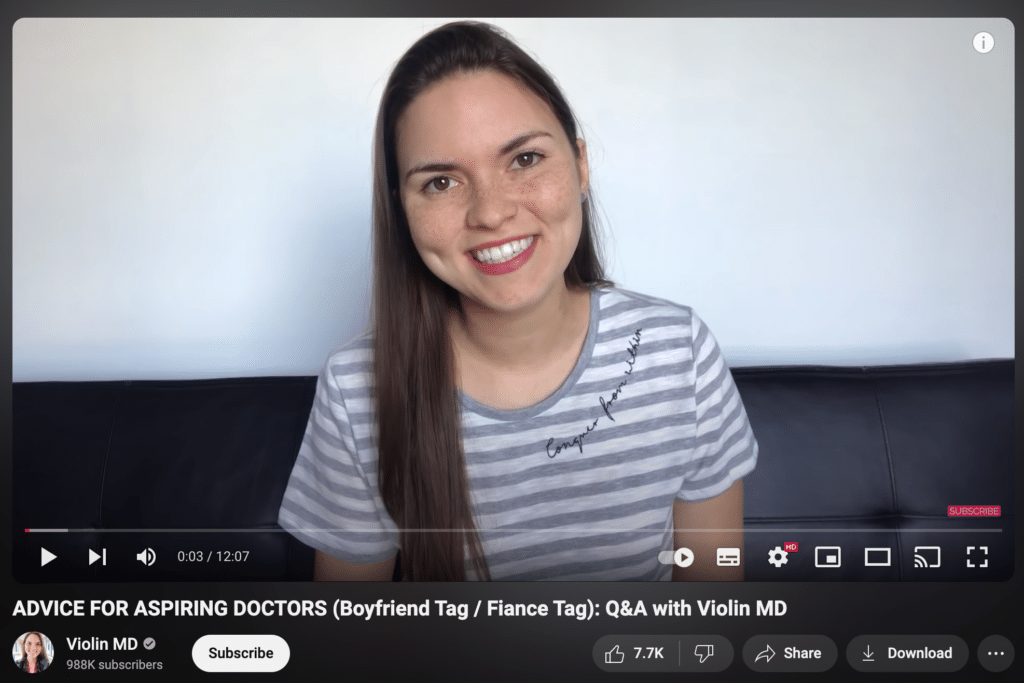



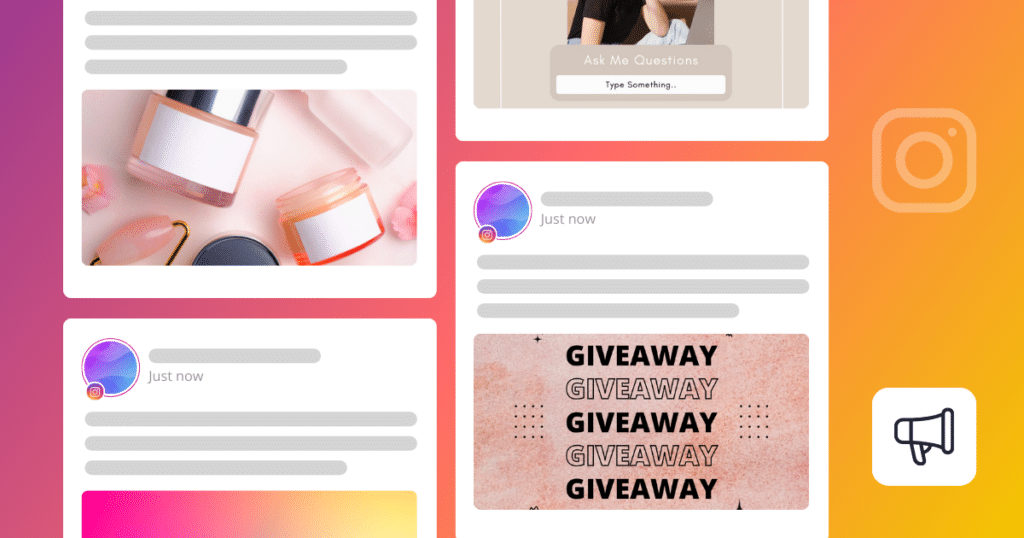







 Customizable tone of voice
Customizable tone of voice  Several variations to choose from
Several variations to choose from  1,000 pre-made AI prompts
1,000 pre-made AI prompts